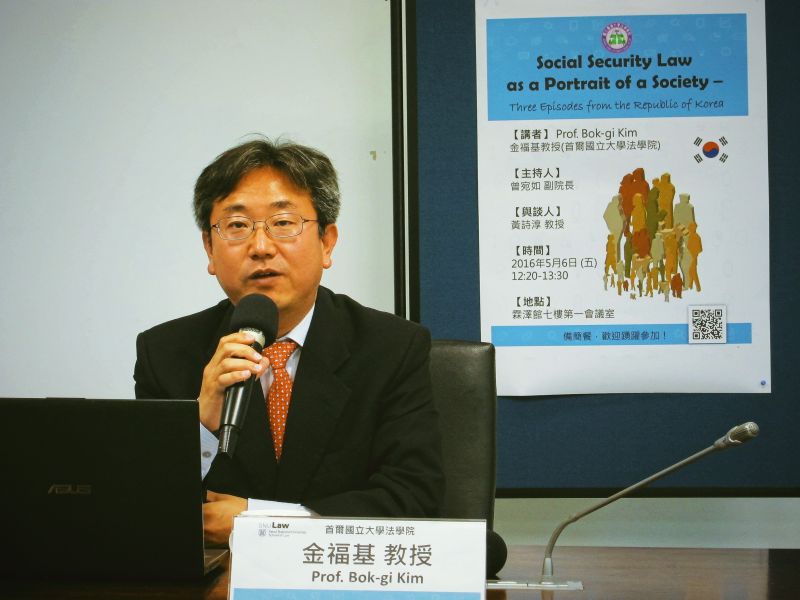Professor Bok-gi Kim from the School of Law at Seoul National University (SNU Law) gave a speech at NTU Law on the topic: “Social Security Law as a Portrait of a Society –Three Episodes from the Republic of Korea.” Professor Kim explained the Korean social security law from three aspects: public assistance, social insurance, and social welfare. He then focused on the aspect of public assistance, and raised three key issues faced by the Korean society today.
The first issue is “lonely death.” Professor Kim pointed out that the traditional value of looking after the elderly is declining in the society. He subsequently explained the circumstances under which families are required to take care of their elderly, in accordance with the Korean laws protecting the fundamental right to survival.
The second problem is “the aging society.” According to Professor Kim, Korea now faces the challenges of an aging population, low birth rates and slow economic growth, all of which call for a sustainable social welfare system. He suggested the government to reform the national pension system and encourage child birth, as well as take the initiative to provide elderly care and promote youth employment. However, there are certainly obstacles to overcome. Reforming the pension system may lead to fiscal crises, violate the constitution, or restrict the freedom of legislation. To address youth unemployment, Korea has passed an act, which mandates that at least 3% of the employees hired by the government-owned organizations should be formerly jobless young people. This act, however, faced a constitutional challenge. The court eventually decided that it does not conflict with the constitution as it aims to promote economic growth and social security.
Finally, Professor Kim mentioned the issue of “affirmative action,” discussing the concepts of substantive equality and reverse discrimination. The example he raised was the Korean act protecting the right to employment of the visually impaired. Under this act, only those with visual impairments are qualified for the massage therapist certification. There were constitutional disputes over whether this act violates people’s right to free choice of employment. The court, however, decided that this act is constitutional in 2008. The reasoning behind the ruling is that massage therapist is the only possible occupation for the visually challenged, and thus the act can protect their livelihood as well as achieve substantive equality.
How is the Korean society going to meet all these challenges? Professor Kim believes that the government should first address the problems of polarizing age groups of the Korean population, and further establish a social welfare system that is sustainable in an aging society. The speech ended with an interesting discussion between Professor Kim and the panelist Professor Sieh-chuen Huang on the challenges faced by families in Taiwan, Korean as well as many other countries with an aging population.


